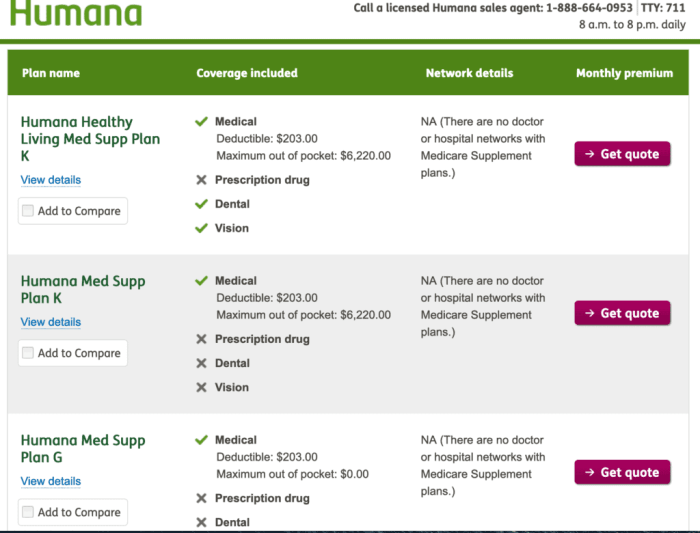Humana Medical Plan stands as a prominent player in the healthcare landscape, offering a range of coverage options designed to meet diverse individual and family needs. This comprehensive plan provides a pathway to quality healthcare, with a focus on preventative care, wellness programs, and access to a vast network of healthcare providers.
Table of Contents
Understanding the intricacies of Humana Medical Plan requires delving into its various components. This guide explores key aspects such as coverage benefits, pricing, network access, enrollment procedures, and customer feedback. We’ll also compare Humana’s offerings to other major health insurance providers, shedding light on the advantages and disadvantages of choosing Humana.
Comparisons with Other Health Insurance Plans
Choosing the right health insurance plan can be a complex decision, and comparing Humana Medical Plans with other major providers is crucial to making an informed choice. This section delves into key differences in coverage, benefits, and pricing, highlighting the advantages and disadvantages of opting for Humana.
Key Differences in Coverage, Benefits, and Pricing
Comparing Humana Medical Plans to other major health insurance providers involves examining key aspects like coverage, benefits, and pricing. Each provider offers a unique set of plans, catering to diverse needs and budgets.
- Coverage: Humana Medical Plans generally offer comprehensive coverage, including hospitalization, surgery, critical illnesses, and preventive health services. However, specific coverage details, such as deductibles, co-pays, and out-of-pocket limits, vary depending on the plan chosen. Comparing these aspects with other providers is essential to understand the financial implications of each plan. For instance, some providers might offer lower deductibles but higher premiums, while others might have broader coverage but higher co-pays.
- Benefits: Humana Medical Plans often include additional benefits like wellness programs, prescription drug coverage, and access to a network of healthcare providers. It’s important to compare the benefits offered by different providers to identify which ones best align with your individual needs. For example, some providers might offer telehealth services, while others might provide discounts on gym memberships or healthy living programs.
- Pricing: The cost of health insurance varies significantly depending on the provider, plan, and individual factors like age, location, and health status. It’s crucial to compare premiums, deductibles, co-pays, and out-of-pocket limits across different providers to determine the most affordable option that meets your requirements.
Advantages and Disadvantages of Choosing Humana
Deciding whether Humana Medical Plans are the right choice involves considering their advantages and disadvantages compared to other providers.
- Advantages:
- Wide Network: Humana has a vast network of healthcare providers, giving you access to a wide range of specialists and hospitals. This is especially beneficial for those who need specialized care or live in areas with limited healthcare options.
- Innovative Programs: Humana offers innovative programs like wellness initiatives, disease management programs, and telemedicine services. These programs can help you stay healthy, manage chronic conditions, and access care conveniently.
- Customer Service: Humana is known for its excellent customer service, providing responsive support and guidance throughout your healthcare journey.
- Disadvantages:
- Pricing: Humana’s premiums might be higher compared to some other providers. It’s essential to compare pricing across different providers to ensure you’re getting the best value for your money.
- Network Limitations: While Humana has a broad network, it might not include all healthcare providers in your area. This could limit your choices, especially if you prefer a specific doctor or hospital.
Comparison Table
A side-by-side comparison table can help you visualize the key differences between Humana Medical Plans and other providers. Here’s an example:
| Feature | Humana | Provider A | Provider B |
|---|---|---|---|
| Coverage | Comprehensive, including hospitalization, surgery, critical illnesses, and preventive health services | Comprehensive, with emphasis on preventive care | Limited coverage, focusing on essential medical services |
| Benefits | Wellness programs, prescription drug coverage, telemedicine services | Telehealth services, discounts on gym memberships | Basic benefits, with limited additional features |
| Pricing | Higher premiums, but may offer competitive deductibles and co-pays | Lower premiums, but potentially higher deductibles and co-pays | Most affordable option, but with limited coverage and benefits |
| Network | Wide network, but might not include all providers in your area | Smaller network, but focused on specific regions | Limited network, with restricted access to specialists |
Industry Trends and Innovations
The healthcare industry is constantly evolving, driven by technological advancements, changing demographics, and a growing focus on value-based care. These trends are significantly impacting Humana Medical Plans, shaping the company’s strategies and offerings to meet the evolving needs of its members.
Impact of Technology on Healthcare
The healthcare industry is rapidly adopting new technologies, leading to significant changes in how care is delivered, accessed, and managed.
- Telehealth: The use of telemedicine has skyrocketed, particularly during the COVID-19 pandemic. Humana has embraced this trend by offering telehealth services, allowing members to consult with doctors remotely via video conferencing or phone calls. This has increased accessibility to healthcare, reduced wait times, and improved patient satisfaction. For example, Humana’s telehealth platform allows members to connect with doctors for non-emergency medical needs, such as follow-up appointments, medication refills, and routine checkups.
- Artificial Intelligence (AI): AI is playing an increasingly vital role in healthcare, aiding in diagnosis, treatment planning, and disease management. Humana is leveraging AI to personalize member experiences, predict health risks, and optimize care pathways. For instance, AI-powered tools can analyze patient data to identify individuals at risk for chronic conditions, enabling early intervention and preventive care.
- Wearable Technology: Wearable devices, such as fitness trackers and smartwatches, are becoming increasingly popular, providing valuable data on health metrics like heart rate, sleep patterns, and activity levels. Humana is integrating wearable technology into its programs, using data from these devices to encourage healthy habits and provide personalized health recommendations.
Shift Towards Value-Based Care, Humana medical plan
The healthcare industry is shifting away from a fee-for-service model towards a value-based care approach, where providers are incentivized to deliver high-quality care while controlling costs. Humana is actively adapting to this shift by:
- Partnering with providers: Humana is working closely with healthcare providers to implement value-based care programs, which focus on improving patient outcomes and reducing unnecessary costs. This involves shared risk and reward models, where providers are financially rewarded for achieving specific quality metrics.
- Developing innovative programs: Humana is developing innovative programs that support value-based care, such as disease management programs for chronic conditions and population health management initiatives. These programs aim to improve patient health, reduce hospital readmissions, and enhance overall care coordination.
Future Trends in Health Insurance
The health insurance landscape is expected to continue evolving, driven by factors such as:
- Growing consumerism in healthcare: Consumers are becoming more active in managing their health and seeking out personalized care options. Humana is responding to this trend by offering a wide range of plans with flexible benefits and digital tools that empower members to make informed healthcare decisions.
- Increased focus on mental health: There is growing awareness of the importance of mental health, and insurance plans are expanding coverage for mental health services. Humana is investing in resources and programs to address the mental health needs of its members, including access to telehealth therapy and mental health support groups.
- Emerging technologies: Advancements in genomics, personalized medicine, and other emerging technologies are poised to revolutionize healthcare. Humana is actively exploring these technologies to develop innovative solutions that improve patient outcomes and personalize care.
Humana’s Strategies for Adapting to Industry Advancements
Humana is proactively adapting to industry advancements by:
- Investing in technology: Humana is investing heavily in technology to enhance its operations, improve member experiences, and develop innovative solutions. This includes developing telehealth platforms, AI-powered tools, and data analytics capabilities.
- Building strategic partnerships: Humana is forming strategic partnerships with technology companies, healthcare providers, and other organizations to leverage their expertise and drive innovation. This includes collaborations with companies specializing in telehealth, wearable technology, and data analytics.
- Focusing on member engagement: Humana is prioritizing member engagement by offering digital tools, personalized health recommendations, and educational resources to empower members to take control of their health.
Legal and Regulatory Considerations: Humana Medical Plan

The healthcare industry is heavily regulated, and health insurance plans like Humana Medical Plans operate within a complex legal and regulatory framework. This section explores the key regulations, compliance requirements, and consumer protection laws that govern health insurance in the United States.
Key Regulations and Compliance Requirements
Humana Medical Plans, like all health insurance providers, must adhere to a comprehensive set of federal and state regulations. These regulations aim to ensure fair practices, protect consumers, and maintain the stability of the healthcare system. Some of the key regulations include:
- The Affordable Care Act (ACA): This landmark legislation has significantly impacted health insurance, introducing provisions like individual mandates, premium subsidies, and expanded Medicaid eligibility. Humana Medical Plans must comply with the ACA’s requirements regarding coverage, affordability, and consumer protections.
- The Health Insurance Portability and Accountability Act (HIPAA): HIPAA establishes national standards for the protection of sensitive patient health information (PHI). Humana Medical Plans are subject to HIPAA’s privacy and security rules, ensuring the confidentiality and integrity of patient data.
- The Employee Retirement Income Security Act (ERISA): ERISA regulates employer-sponsored health insurance plans. If Humana Medical Plans are offered through an employer, they must comply with ERISA’s provisions regarding plan administration, fiduciary responsibilities, and disclosure requirements.
- State Insurance Regulations: Each state has its own set of insurance regulations, which may vary in their specific requirements. Humana Medical Plans must comply with the regulations of the states where they operate, including those related to coverage mandates, rate setting, and consumer protection.
Consumer Protection Laws
Consumer protection laws play a vital role in safeguarding the rights of individuals who purchase health insurance. These laws aim to prevent unfair or deceptive practices by insurance companies and ensure that consumers have access to clear and accurate information about their coverage. Some key consumer protection laws include:
- The Patient Protection and Affordable Care Act (PPACA): This law includes provisions related to consumer protection, such as prohibiting health insurance companies from denying coverage based on pre-existing conditions, requiring them to offer essential health benefits, and establishing a marketplace for individuals to compare and purchase plans.
- The Health Insurance Marketplace: The Health Insurance Marketplace (also known as Healthcare.gov) provides a platform for individuals to compare and purchase health insurance plans from different insurers, including Humana Medical Plans. This platform helps consumers make informed decisions about their coverage.
- State Consumer Protection Laws: Each state has its own consumer protection laws related to insurance. These laws may address issues such as unfair claims practices, rate discrimination, and the right to appeal insurance decisions.
Recent Changes and Updates
The healthcare landscape is constantly evolving, leading to changes and updates in regulations. Some recent developments include:
- The No Surprises Act: This law aims to protect patients from surprise medical bills, which occur when they receive care from an out-of-network provider without prior knowledge. The law requires insurers to negotiate rates with out-of-network providers and provides a process for resolving disputes over surprise bills.
- The Mental Health Parity and Addiction Equity Act (MHPAEA): This law requires health insurance plans to cover mental health and substance use disorder benefits at the same level as medical and surgical benefits. Humana Medical Plans must comply with MHPAEA’s requirements regarding coverage and cost-sharing.
- The Telehealth Expansion: The COVID-19 pandemic accelerated the adoption of telehealth services. Many states have enacted legislation to permanently expand telehealth coverage and payment policies. Humana Medical Plans are adapting their offerings to meet the growing demand for telehealth services.
Future Outlook for Humana Medical Plans

Humana’s future in the health insurance market appears bright, driven by a combination of factors, including its strong financial position, commitment to innovation, and focus on value-based care. The company’s ability to adapt to evolving market dynamics and leverage its strengths will be crucial in shaping its future trajectory.
Factors Influencing Humana’s Future
The health insurance industry is constantly evolving, and Humana is well-positioned to navigate these changes. Several key factors will influence the company’s future success:
- Aging Population: The United States is experiencing an aging population, with a growing number of individuals entering their senior years. This demographic shift presents a significant opportunity for Humana, as it specializes in Medicare Advantage plans and other products tailored to seniors.
- Technological Advancements: Technological advancements, such as telehealth and data analytics, are transforming healthcare delivery. Humana is actively embracing these innovations to enhance its offerings and improve member experiences.
- Shift to Value-Based Care: The healthcare industry is moving towards a value-based care model, where providers are incentivized to deliver high-quality care at lower costs. Humana is at the forefront of this shift, actively partnering with providers to implement value-based care initiatives.
- Regulatory Landscape: The regulatory landscape for health insurance is complex and subject to change. Humana must navigate these regulations effectively to ensure compliance and maintain its competitive edge.
Humana’s Strategies for Growth
Humana is employing several strategies to expand its reach and market share:
- Expanding into New Markets: Humana is actively expanding into new geographic markets, both domestically and internationally, to reach a wider customer base.
- Developing New Products and Services: The company is constantly innovating and developing new products and services to meet the evolving needs of its customers. This includes offerings in areas such as telehealth, wellness programs, and chronic disease management.
- Investing in Technology: Humana is investing heavily in technology to enhance its operations, improve customer experiences, and gain a competitive advantage. This includes investments in data analytics, artificial intelligence, and digital platforms.
- Strengthening Partnerships: Humana is forging strategic partnerships with healthcare providers, technology companies, and other stakeholders to expand its reach and enhance its value proposition.
Long-Term Prospects for Humana Medical Plans
Humana’s long-term prospects are promising. The company’s strong financial position, commitment to innovation, and focus on value-based care position it well to capitalize on the growing healthcare market. Humana’s ability to adapt to changing market dynamics and leverage its strengths will be crucial in determining its future success.
Navigating the complex world of healthcare can be daunting, but Humana Medical Plan strives to simplify the process. By offering a variety of plans tailored to individual needs, Humana empowers individuals to take control of their health and well-being. With a strong emphasis on customer satisfaction, Humana continues to innovate and adapt to the evolving healthcare landscape, ensuring its position as a trusted partner in health.
Humana offers a variety of medical plans, including Medicare Advantage plans. If you’re eligible for Medicare, you might find that Medicare Advantage plans Humana offers a comprehensive and affordable option. Humana’s Medicare Advantage plans often include additional benefits, such as prescription drug coverage, dental, vision, and hearing care, which can make a significant difference in your overall health and well-being.


